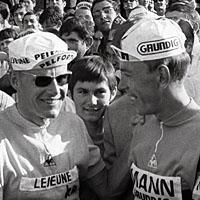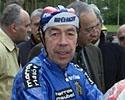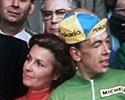
Recently on Cyclingnews.com |
Tales from the peloton, June 17, 2008
The man who always almost won
If you look aggressive, are people automatically aggressive with you? How about if you look happy? Do people treat you as a friend? And what if you just look miserable? Cyclingnews' Les Woodland recounts the sad tale of a man who became famous for the races he almost won.
 |
Well, if you really want to know how people treat you when your face hints that you're standing in wet underwear, the man to ask is Herman van Springel. He was born to be an undertaker. He wouldn't have had to put on a professional sad face as he lowered the coffin: he'd just have to look normal.
Well, maybe he had reason to feel miserable because poor old Herman was famous for the races that he almost won. Almost won. And when he did win his favourite race, he won it so often that it became boring and he helped bring it to an end.
Herman's greatest hour should have been 40 years ago this summer. If he stood on his toes, he was so close to Paris in the Tour de France that he could have seen the tip of the Eiffel Tower. He had 16 seconds' lead and only 54km to ride. He could lose three seconds a kilometre and still win. But he lost more than that and he lost. Instead, the closing time trial and the final yellow jersey was won by the bespectacled Dutchman, Jan Janssen, and the one thing nobody recalls of that year's Tour is that Herman van Springel came second.
Two years later he almost won the Vuelta. He came third. The year after that, he came second in the Giro. In 1968 he was beaten by Vittorio Adorni and came second in the world championship. He also twice came second in Paris-Roubaix.
If you see a pattern in all this, don't flatter yourself that you're a good mathematician: it really isn't that hard to work out. "He was a rider whose ambitions never lived up to his talent," was how the French writer Pierre Chany put it.
The one race that van Springel persistently showed well in was Bordeaux-Paris. It doesn't exist now - he won it so often that it took the fun out of it and added to the event's other problems - but it used to be the longest classic of the year. It started in south-west France, on the ridge of the Garonne valley, rode through the night and then at dawn carried on to Paris but behind buzzing Dernys. He won it seven times, around 4,000 kilometres of racing.
But even then things contrived to give Herman reason to look glum. In 1974 he won by 15 minutes and the judges had disqualified him. Why? Because the police had taken him the wrong way.
 |
The race was going through Lèves, having done 450km. Van Springel had put in some of the 65kmh bursts that none of the others could match and he cruised further and further ahead of the rest until he had almost a quarter of an hour. Van Springel was behind his pacer, a reserve pacer was behind him and then came a couple of radio reporters and finally the organiser, Jacques Goddet, in his red car and a team car. Ahead of all of them was a police car.
It was the gendarmerie that made the mistake. At one point signs pointed traffic to get into lane for a choice of destinations. There was still just the single road but after a while one side moved off to Maintenon and the other to Dreux. The police took the route straight on to Dreux. They should have taken the road for Maintenon.
Sadly for van Springel, it took a moment before anyone realised. A good moment. In fact he and his pacer sensed something had gone wrong before Goddet did. They had noticed there weren't any spectators any more. And they also noticed that they were in town traffic instead of on a closed road. Van Springel and his pacers slowed and looked back for guidance. By then Goddet had reacted and he had his map of France on his lap.
"Don't turn round," he shouted. "Go straight on. You can pick up a road that runs parallel to the course and get back on route at Nogent-le-Roi."
The trouble was that Nogent-le-Roi was another 22km and in all that time the second man, Régis Delépine, would be closing the gap. By now van Springel was riding not past informed fans but deeply puzzled shoppers and other drivers. The police car had its sirens as well as its flashing lights going and Goddet was up beside the race group and blocking the entire road.
Van Springel, for whom French was a second language, managed nevertheless to make his disappointment understood.
 |
"Tell you what, then," Goddet said, "hang on to your team car and let them tow you and the pacers can keep up." And so for four kilometres, in front of onlookers even more mystified than those back down the road, the man famous as Mr Bordeaux-Paris was seen clinging to the door handles of a car as the police screamed everyone out of the way up front. Even so, by the time they got back to the course, van Springel had only half the lead he had had before.
Mournfully but used to this bad luck, he settled back behind his Derny and, full credit to him, got his lead back up to what it had been. He got in a quarter of an hour before Delépine but the judges disqualified him.
"What else are we going to do?" they asked. "You didn't stick to the right route and you even hung on to a car."
"But what choice did he have?" his manager fumed. "The police led him the wrong way and the organiser told him to take a tow. The only innocent person in all this is van Springel."
"Sorry, no dice."
"But..." And now came the clinching argument. "Yes, he went the wrong way. Yes, he took a tow from a car. But he still won by more than 14 minutes and on top of that he rode 22km further than the others!"
"Hmmm..."
Verdict: a tie. Two winners, far enough apart to time with an alarm clock, but nevertheless a tie. Even on his greatest day, Herman couldn't escape his curse.
Photography
For a thumbnail gallery of these images, click here
Images by AFP Photo
- Van Springel congratulates Janssen after being defeated on the final stage of the 1968 Tour.
- Van Springel still rides - he is pictured here (in blue) at the UCI centennary ride in Paris in 2000 along with Swiss rider Goldfried Wiellman.
- Van Springel never won a stage in 1973 but far right, you can see he took home the green jersey in the Tour.
